新概念第二册Lesson 62 After the fire讲义
文档属性
| 名称 | 新概念第二册Lesson 62 After the fire讲义 | 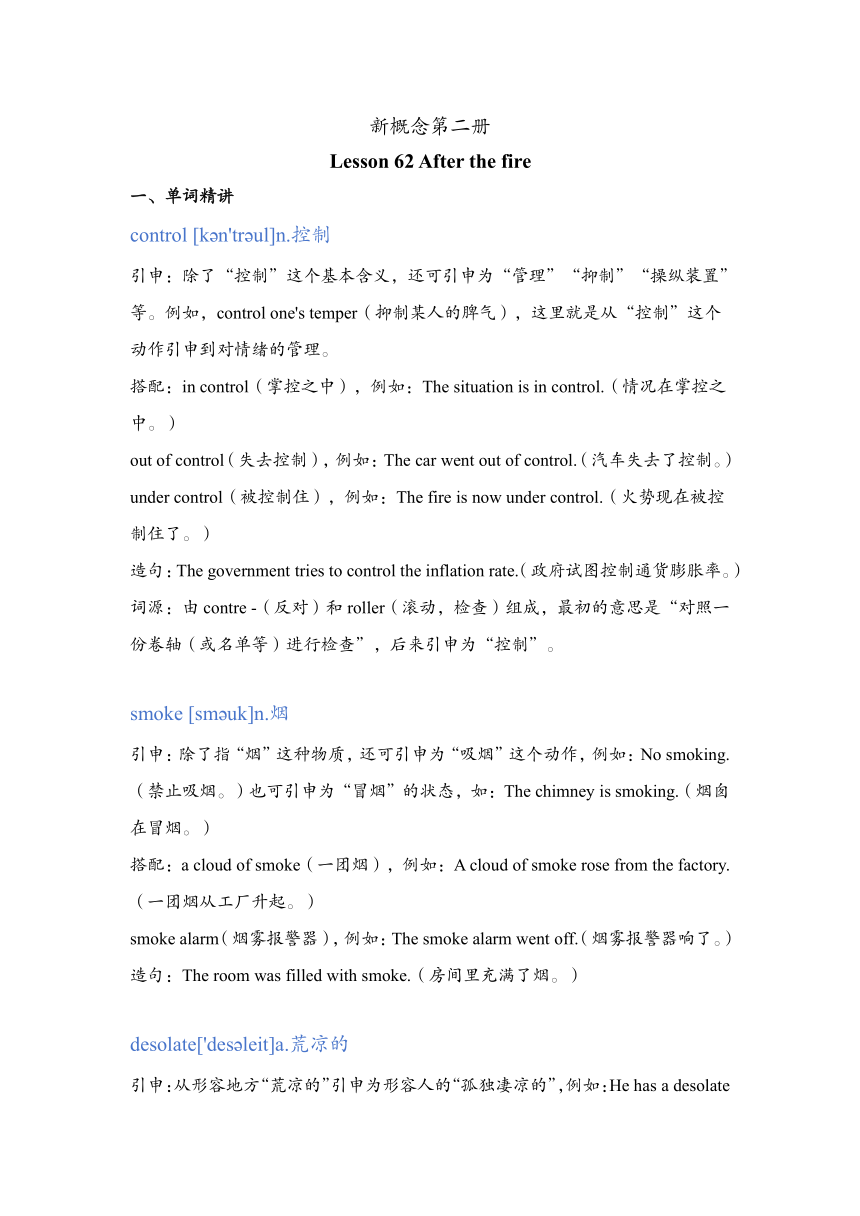 | |
| 格式 | docx | ||
| 文件大小 | 189.4KB | ||
| 资源类型 | 教案 | ||
| 版本资源 | 新概念英语 | ||
| 科目 | 英语 | ||
| 更新时间 | 2024-11-23 20:58:15 | ||
图片预览

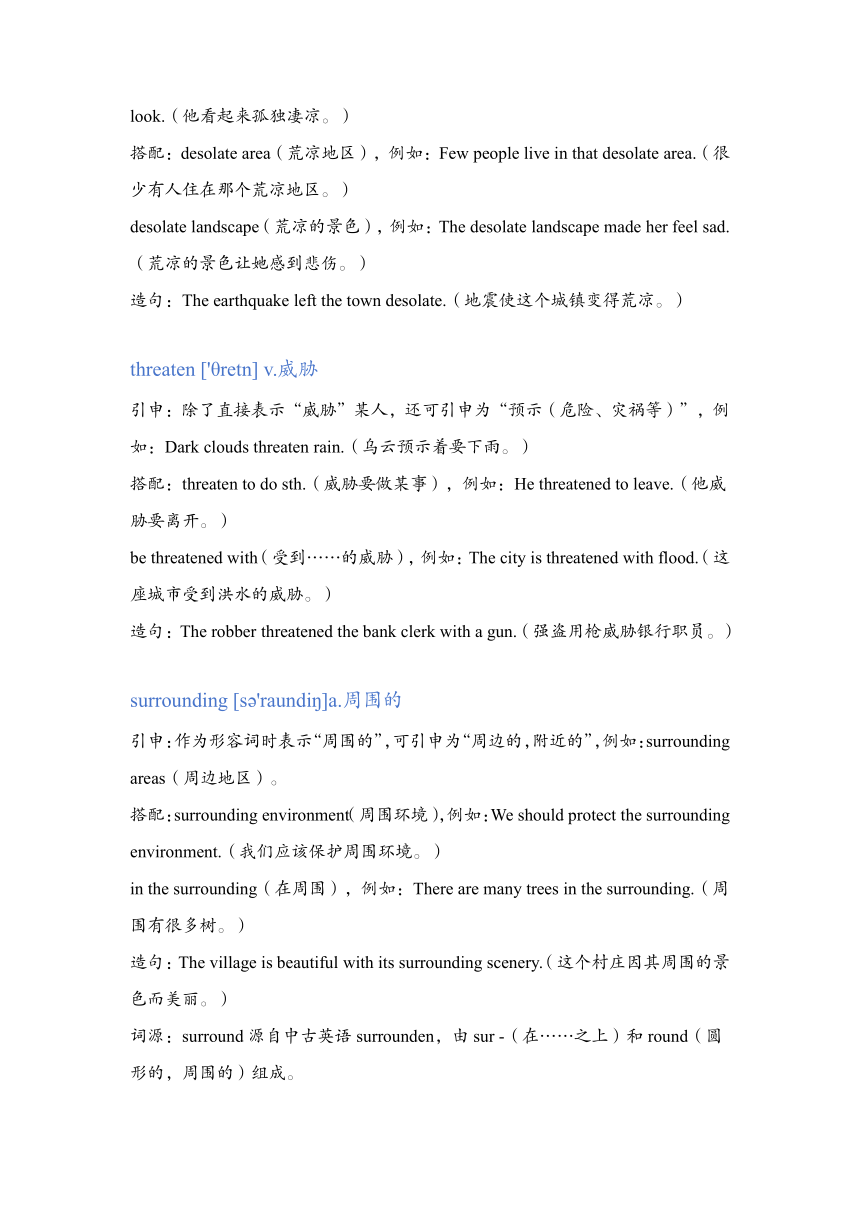
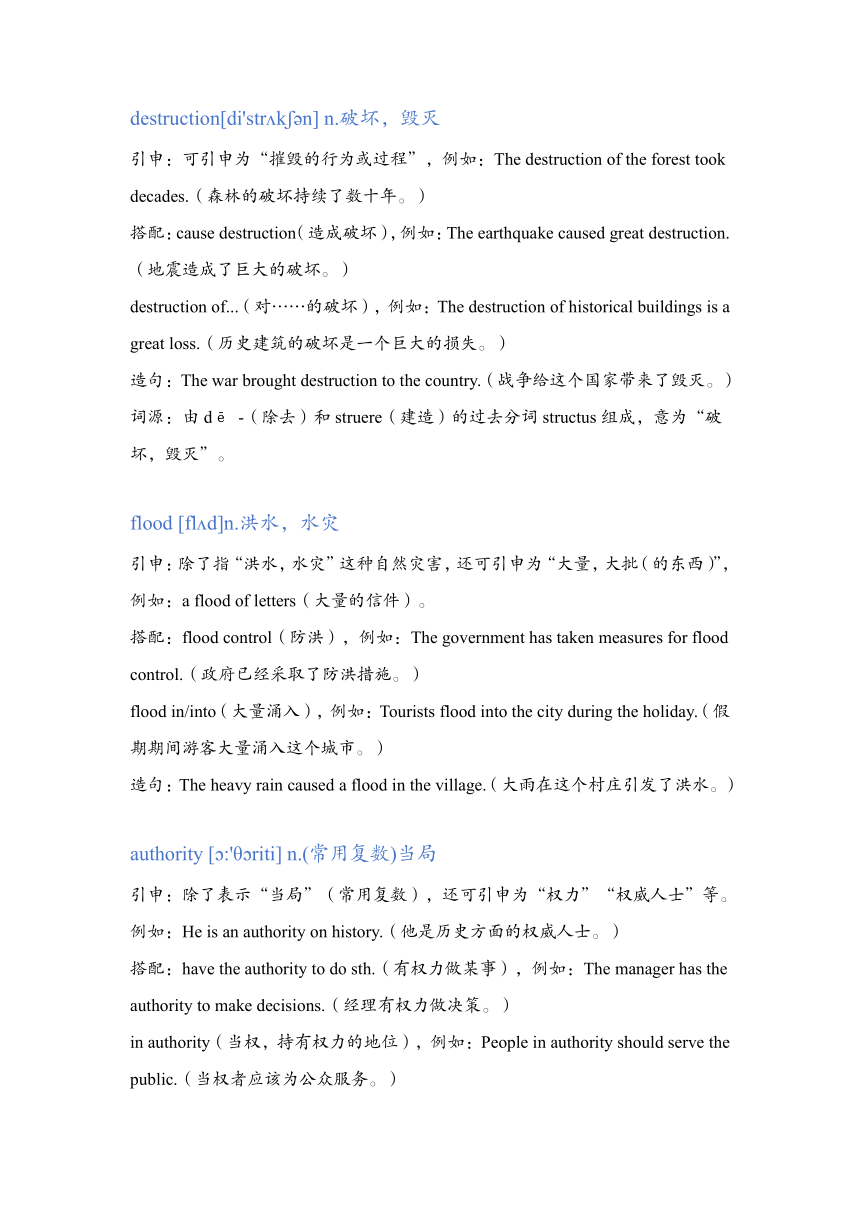
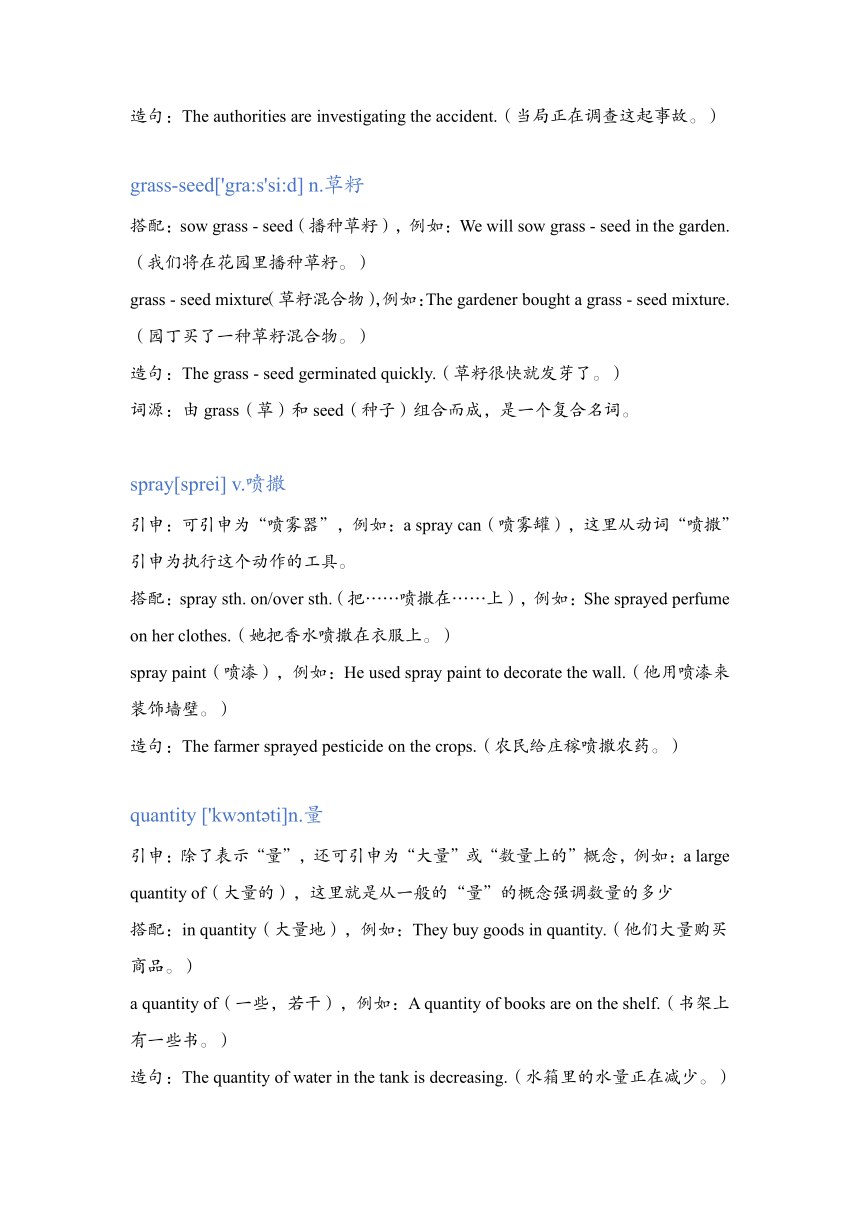
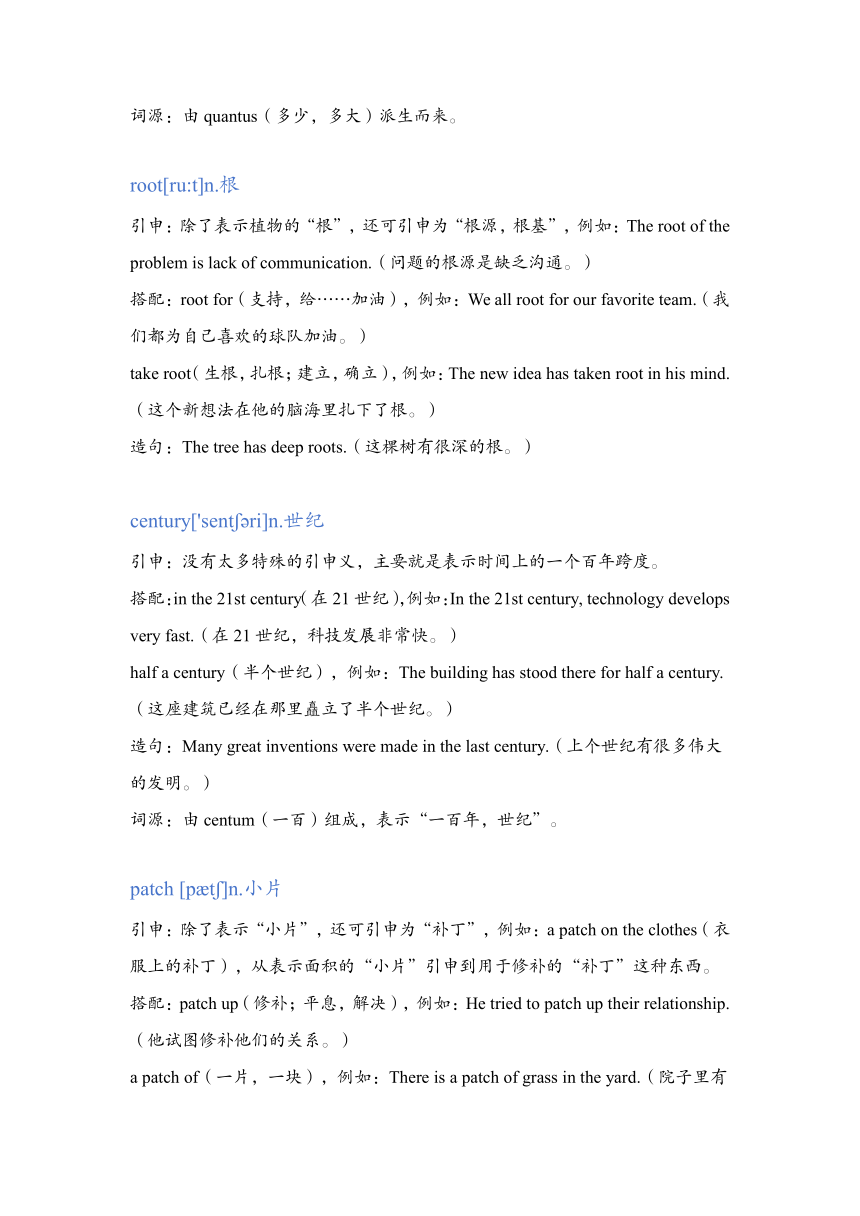
文档简介
新概念第二册
Lesson 62 After the fire
单词精讲
control [k n'tr ul]n.控制
引申:除了“控制”这个基本含义,还可引申为“管理”“抑制”“操纵装置”等。例如,control one's temper(抑制某人的脾气),这里就是从“控制”这个动作引申到对情绪的管理。
搭配:in control(掌控之中),例如:The situation is in control.(情况在掌控之中。)
out of control(失去控制),例如:The car went out of control.(汽车失去了控制。)
under control(被控制住),例如:The fire is now under control.(火势现在被控制住了。)
造句:The government tries to control the inflation rate.(政府试图控制通货膨胀率。)
词源:由contre -(反对)和roller(滚动,检查)组成,最初的意思是“对照一份卷轴(或名单等)进行检查”,后来引申为“控制”。
smoke [sm uk]n.烟
引申:除了指“烟”这种物质,还可引申为“吸烟”这个动作,例如:No smoking.(禁止吸烟。)也可引申为“冒烟”的状态,如:The chimney is smoking.(烟囱在冒烟。)
搭配:a cloud of smoke(一团烟),例如:A cloud of smoke rose from the factory.(一团烟从工厂升起。)
smoke alarm(烟雾报警器),例如:The smoke alarm went off.(烟雾报警器响了。)
造句:The room was filled with smoke.(房间里充满了烟。)
desolate['des leit]a.荒凉的
引申:从形容地方“荒凉的”引申为形容人的“孤独凄凉的”,例如:He has a desolate look.(他看起来孤独凄凉。)
搭配:desolate area(荒凉地区),例如:Few people live in that desolate area.(很少有人住在那个荒凉地区。)
desolate landscape(荒凉的景色),例如:The desolate landscape made her feel sad.(荒凉的景色让她感到悲伤。)
造句:The earthquake left the town desolate.(地震使这个城镇变得荒凉。)
threaten ['θretn] v.威胁
引申:除了直接表示“威胁”某人,还可引申为“预示(危险、灾祸等)”,例如:Dark clouds threaten rain.(乌云预示着要下雨。)
搭配:threaten to do sth.(威胁要做某事),例如:He threatened to leave.(他威胁要离开。)
be threatened with(受到……的威胁),例如:The city is threatened with flood.(这座城市受到洪水的威胁。)
造句:The robber threatened the bank clerk with a gun.(强盗用枪威胁银行职员。)
surrounding [s 'raundi ]a.周围的
引申:作为形容词时表示“周围的”,可引申为“周边的,附近的”,例如:surrounding areas(周边地区)。
搭配:surrounding environment(周围环境),例如:We should protect the surrounding environment.(我们应该保护周围环境。)
in the surrounding(在周围),例如:There are many trees in the surrounding.(周围有很多树。)
造句:The village is beautiful with its surrounding scenery.(这个村庄因其周围的景色而美丽。)
词源:surround源自中古英语surrounden,由sur -(在……之上)和round(圆形的,周围的)组成。
destruction[di'str k n] n.破坏,毁灭
引申:可引申为“摧毁的行为或过程”,例如:The destruction of the forest took decades.(森林的破坏持续了数十年。)
搭配:cause destruction(造成破坏),例如:The earthquake caused great destruction.(地震造成了巨大的破坏。)
destruction of...(对……的破坏),例如:The destruction of historical buildings is a great loss.(历史建筑的破坏是一个巨大的损失。)
造句:The war brought destruction to the country.(战争给这个国家带来了毁灭。)
词源:由dē -(除去)和struere(建造)的过去分词structus组成,意为“破坏,毁灭”。
flood [fl d]n.洪水,水灾
引申:除了指“洪水,水灾”这种自然灾害,还可引申为“大量,大批(的东西)”,例如:a flood of letters(大量的信件)。
搭配:flood control(防洪),例如:The government has taken measures for flood control.(政府已经采取了防洪措施。)
flood in/into(大量涌入),例如:Tourists flood into the city during the holiday.(假期期间游客大量涌入这个城市。)
造句:The heavy rain caused a flood in the village.(大雨在这个村庄引发了洪水。)
authority [ :'θ riti] n.(常用复数)当局
引申:除了表示“当局”(常用复数),还可引申为“权力”“权威人士”等。例如:He is an authority on history.(他是历史方面的权威人士。)
搭配:have the authority to do sth.(有权力做某事),例如:The manager has the authority to make decisions.(经理有权力做决策。)
in authority(当权,持有权力的地位),例如:People in authority should serve the public.(当权者应该为公众服务。)
造句:The authorities are investigating the accident.(当局正在调查这起事故。)
grass-seed['gra:s'si:d] n.草籽
搭配:sow grass - seed(播种草籽),例如:We will sow grass - seed in the garden.(我们将在花园里播种草籽。)
grass - seed mixture(草籽混合物),例如:The gardener bought a grass - seed mixture.(园丁买了一种草籽混合物。)
造句:The grass - seed germinated quickly.(草籽很快就发芽了。)
词源:由grass(草)和seed(种子)组合而成,是一个复合名词。
spray[sprei] v.喷撒
引申:可引申为“喷雾器”,例如:a spray can(喷雾罐),这里从动词“喷撒”引申为执行这个动作的工具。
搭配:spray sth. on/over sth.(把……喷撒在……上),例如:She sprayed perfume on her clothes.(她把香水喷撒在衣服上。)
spray paint(喷漆),例如:He used spray paint to decorate the wall.(他用喷漆来装饰墙壁。)
造句:The farmer sprayed pesticide on the crops.(农民给庄稼喷撒农药。)
quantity ['kw nt ti]n.量
引申:除了表示“量”,还可引申为“大量”或“数量上的”概念,例如:a large quantity of(大量的),这里就是从一般的“量”的概念强调数量的多少
搭配:in quantity(大量地),例如:They buy goods in quantity.(他们大量购买商品。)
a quantity of(一些,若干),例如:A quantity of books are on the shelf.(书架上有一些书。)
造句:The quantity of water in the tank is decreasing.(水箱里的水量正在减少。)
词源:由quantus(多少,多大)派生而来。
root[ru:t]n.根
引申:除了表示植物的“根”,还可引申为“根源,根基”,例如:The root of the problem is lack of communication.(问题的根源是缺乏沟通。)
搭配:root for(支持,给……加油),例如:We all root for our favorite team.(我们都为自己喜欢的球队加油。)
take root(生根,扎根;建立,确立),例如:The new idea has taken root in his mind.(这个新想法在他的脑海里扎下了根。)
造句:The tree has deep roots.(这棵树有很深的根。)
century['sent ri]n.世纪
引申:没有太多特殊的引申义,主要就是表示时间上的一个百年跨度。
搭配:in the 21st century(在21世纪),例如:In the 21st century, technology develops very fast.(在21世纪,科技发展非常快。)
half a century(半个世纪),例如:The building has stood there for half a century.(这座建筑已经在那里矗立了半个世纪。)
造句:Many great inventions were made in the last century.(上个世纪有很多伟大的发明。)
词源:由centum(一百)组成,表示“一百年,世纪”。
patch [p t ]n.小片
引申:除了表示“小片”,还可引申为“补丁”,例如:a patch on the clothes(衣服上的补丁),从表示面积的“小片”引申到用于修补的“补丁”这种东西。
搭配:patch up(修补;平息,解决),例如:He tried to patch up their relationship.(他试图修补他们的关系。)
a patch of(一片,一块),例如:There is a patch of grass in the yard.(院子里有一片草地。)
造句:She sewed a patch on the torn part of the bag.(她在袋子撕破的地方缝了一个补丁。)
blacken['bl k n]v.变黑,发暗
引申:除了表示“变黑,发暗”这种颜色的变化,还可引申为“诋毁,抹黑”,例如:Don't blacken his name.(不要诋毁他的名声。)
搭配:blacken sth. with sth.(用……使……变黑),例如:The smoke blackened the wall with soot.(烟中的煤烟使墙变黑了。)
blacken out(使变黑;熄灭;封锁(新闻等)),例如:The power failure blackened out the whole city.(停电使整个城市陷入黑暗。)
造句:The fire blackened the ceiling.(火使天花板变黑了。)
词源:是black(黑色的)的动词形式,由black加上 - en(使……变得)后缀组成。
二、重点句型
过去完成时和过去完成进行时
过去完成进行时的构成:had been +现在分词
过去完成进行时用于强调某动作在过去更早的某一段时间内一直在进行,并对过去某一时刻产生结果,过去完成进行时也可用来表示过去经常重复的动作,还可以表示根据直接或间接的证据而得出结论。与它经常连用的表示时间的词有before,for,since,all day等。
She was very tired. She had been typing letters all day.
Jill was angry. Jim had been phoning her every night for a whole week.
Her eyes were red. It was obvious she had been crying.
在包含间接引语的句子中,如果引述词是过去时态,则现在完成进行时要改为过去完成进行时。
过去完成时与过去完成进行时有时可以互换。但需要表示某个工作已经完成时,只能用过去完成时。
When I arrived, they’d alredy put the fire out.
【Special Difficulties】难点
Control and Check
control
① vt. 控制,指挥,支配,管理
Don’t try to control other people.
② n. 控制(能力),支配(能力)
It’s hard to keep the number of people coming into the country under control.
check vt. 检查,核对,查看
They’re going to check our passports.
Great and Big
great adj. 大的(强调重要性),伟大的,重大的,重要的
Frank has just made a great decision.
big adj. 大的(强调面积、体积、规模上的大)
Sam is a big man.
Soil and Ground
soil n. 泥土(能让植物生长的),土,土地,土壤
Trees and grass grow quickly in rich soil.
ground n. 地表,地面(与土壤无关),场地,土地
He threw the cup to the ground.
重点句型
Firemen had been fighting the forest fire for nearly three weeks before they could get it under control.
消防员在能够控制住大火之前已经持续与森林大火搏斗了将近三周。
主句是“Firemen had been fighting the forest fire for nearly three weeks”,使用了过去完成进行时,表示在过去某个时间之前一直在进行的动作
从句是“before they could get it under control”,其中“before”引导时间状语从句,“could get it under control”是从句中的谓语部分,
fight sth. 和……作搏斗
get it under control表示“使它得到控制”,get有“使……处于某种状态”的含义,“get+宾语+介词短语”作宾补:
The Government can no longer keep prices under control. 政府已控制不住物价。
Get the room in order.
A short time before, great trees had covered the countryside for miles around.
“A short time before”是时间状语,表示“不久之前”;“great trees”是句子的主语,“had covered”是过去完成时的谓语形式,表示过去的过去发生的动作
“the countryside”是宾语,“for miles around”是后置定语,修饰“the countryside”,表示“方圆数英里的乡村”。
a short time before和a short time ago都可以与段时间相连
a short time before 不久以前,从过去某一点时间算起,一段时间以前
a short time ago 过去某段时间,从现在算起,一段时间以前
for miles around 方圆几英里(around表示“在周围,向四周”)
This is the only modern building for miles around.
Now, smoke still rose up from the warm ground over the desolate hills.
大火过后,虽然火势得到控制,但仍然有烟雾从被火烧过的温暖地面升起的景象,进一步强调大火造成的破坏。
“Now”是时间状语,表示现在的状况;“smoke”是主语,“rose up”是谓语,是“rise up”的过去式,表示“升起”,“from the warm ground over the desolate hills”是地点状语,其中“over the desolate hills”是修饰“the warm ground”的后置定语,表示在荒凉的小山上方的温暖地面。
rise up (from) 升上来
smoke rise up (烟、雾)弥漫
Winter was coming on and the hills threatened the surrounding villages with destruction, for heavy rain would not only wash away the soil but would cause serious floods as well.
随着冬天的临近,由于大火过后山丘的状况,这些山丘对周围的村庄构成了毁灭的威胁,原因是大雨不仅会冲走土壤,还会引发严重的洪水。
这是一个并列复合句。由“and”连接两个并列句,第一个并列句“Winter was coming on”是主系表结构,表示冬天即将来临;第二个并列句“the hills threatened the surrounding villages with destruction”中,“the hills”是主语,“threatened”是谓语,“the surrounding villages”是宾语,“with destruction”是状语,表示“以毁灭(的方式)”。“for”引导原因状语从句,在这个从句中“heavy rain”是主语,“would not only wash away the soil but would cause serious floods as well”是并列谓语结构,“not only...but...as well”表示“不但……而且……”。
winter was coming on 冬季即将来临 (季节的来临的通用表达式),come on的过去进行时形式表示的是过去将来时,它在这里表示季节的“到来,来临”:
When spring comes on, there will be flowers everywhere.
I was still in the forest when night came on.
wash away 冲掉,冲走,洗掉
A wooden bridge was washed away by the flood.
I can’t wash the spot away.
When the fire had at last been put out, the forest authorities ordered several tons of a special type of grass-seed which would grow quickly.
大火最终被扑灭之后,森林管理部门订购了数吨一种能够快速生长的特殊草籽,为后文的植被恢复做铺垫。
这是一个主从复合句。“When the fire had at last been put out”是时间状语从句,使用了过去完成时的被动语态,表示在过去某个时间之前大火已经被扑灭;主句是“the forest authorities ordered several tons of a special type of grass - seed”,其中“the forest authorities”是主语,“ordered”是谓语,“several tons of a special type of grass - seed”是宾语。“which would grow quickly”是定语从句,修饰“grass - seed”,表示这种草籽会快速生长。
put out 扑灭
order 定购
type 强调与其他同类的东西有明显不同的特征的种类,与kind有区别
The seed was sprayed over the ground in huge quantities by aeroplanes.
草籽是通过飞机大量地播撒到地面上的,体现了一种大规模的植被恢复行动。
这是一个简单句,使用了被动语态。“The seed”是主语,“was sprayed”是谓语,是“spray”(喷撒)的被动形式,“over the ground”是地点状语,“in huge quantities”是方式状语,表示“大量地”,“by aeroplanes”是动作的执行者,表示“被飞机(喷撒)”。
quantity单数时仅表示“数量”,既可以用于表示多也可以用于表示少:
They drank a large /great /small quantity of beer last night.
quantity复数时表示“大量”:
He bought books in (large) quantities.
By then, however, in many places the grass had already taken root.
take root表示“生根”,这个短语也可以表示某处思想/想法等“扎根”:
This type of grass takes root easily.
The idea has taken root in his mind.
The planes had been planting seed for nearly a month when it began to rain.
飞机已经播种了将近一个月的时候开始下雨了。
这是一个主从复合句。主句是“The planes had been planting seed for nearly a month”,使用了过去完成进行时,表示在过去某个时间之前一直在进行的动作,即飞机一直在播撒草籽将近一个月;从句是“when it began to rain”,“when”引导时间状语从句,“it”是形式主语,“began to rain”是谓语,表示开始下雨。
By then, however, in many places the grass had already taken root.
然而,到那时,在许多地方草已经生根了。
这是一个简单句。“By then”是时间状语,表示“到那时”;“however”是转折副词;“in many places”是地点状语;“the grass”是主语,“had already taken root”是过去完成时的谓语形式,表示在过去某个时间之前已经完成的动作,“take root”是固定短语,意思是“生根”。
“take root”生动地描绘出草籽已经扎根生长的状态。
In place of the great trees which had been growing there for centuries patches of green had begun to appear in the blackened soil.
在那些原本生长了几个世纪的大树所在之处,一片片绿色植物已开始在变黑的土壤里出现。
这是一个主从复合句。“In place of the great trees”是状语,表示“代替,取代”;“which had been growing there for centuries”是定语从句,修饰“the great trees”,表示那些已经在那里生长了几个世纪的大树;主句是“patches of green had begun to appear in the blackened soil”,其中“patches of green”是主语,表示“一片片绿色(的植物)”,“had begun to appear”是过去完成时的谓语形式,表示开始出现,“in the blackened soil”是地点状语,表示在变黑的土壤里。
in place of 替代,取代 (只能指代位置、空间,原来放的东西现在不在了)
In place of a cup , I put a vase there. 以前放的是茶杯,现在放的是花瓶。
Jane answered the phone in place of Mary.
instead of 替代+没做的事
Instead of staying home, I went to school. (此句就不能用“in place of”,而指地点空间时,既可以用“in place of”也可以用“instead of”。)
Lesson 62 After the fire
单词精讲
control [k n'tr ul]n.控制
引申:除了“控制”这个基本含义,还可引申为“管理”“抑制”“操纵装置”等。例如,control one's temper(抑制某人的脾气),这里就是从“控制”这个动作引申到对情绪的管理。
搭配:in control(掌控之中),例如:The situation is in control.(情况在掌控之中。)
out of control(失去控制),例如:The car went out of control.(汽车失去了控制。)
under control(被控制住),例如:The fire is now under control.(火势现在被控制住了。)
造句:The government tries to control the inflation rate.(政府试图控制通货膨胀率。)
词源:由contre -(反对)和roller(滚动,检查)组成,最初的意思是“对照一份卷轴(或名单等)进行检查”,后来引申为“控制”。
smoke [sm uk]n.烟
引申:除了指“烟”这种物质,还可引申为“吸烟”这个动作,例如:No smoking.(禁止吸烟。)也可引申为“冒烟”的状态,如:The chimney is smoking.(烟囱在冒烟。)
搭配:a cloud of smoke(一团烟),例如:A cloud of smoke rose from the factory.(一团烟从工厂升起。)
smoke alarm(烟雾报警器),例如:The smoke alarm went off.(烟雾报警器响了。)
造句:The room was filled with smoke.(房间里充满了烟。)
desolate['des leit]a.荒凉的
引申:从形容地方“荒凉的”引申为形容人的“孤独凄凉的”,例如:He has a desolate look.(他看起来孤独凄凉。)
搭配:desolate area(荒凉地区),例如:Few people live in that desolate area.(很少有人住在那个荒凉地区。)
desolate landscape(荒凉的景色),例如:The desolate landscape made her feel sad.(荒凉的景色让她感到悲伤。)
造句:The earthquake left the town desolate.(地震使这个城镇变得荒凉。)
threaten ['θretn] v.威胁
引申:除了直接表示“威胁”某人,还可引申为“预示(危险、灾祸等)”,例如:Dark clouds threaten rain.(乌云预示着要下雨。)
搭配:threaten to do sth.(威胁要做某事),例如:He threatened to leave.(他威胁要离开。)
be threatened with(受到……的威胁),例如:The city is threatened with flood.(这座城市受到洪水的威胁。)
造句:The robber threatened the bank clerk with a gun.(强盗用枪威胁银行职员。)
surrounding [s 'raundi ]a.周围的
引申:作为形容词时表示“周围的”,可引申为“周边的,附近的”,例如:surrounding areas(周边地区)。
搭配:surrounding environment(周围环境),例如:We should protect the surrounding environment.(我们应该保护周围环境。)
in the surrounding(在周围),例如:There are many trees in the surrounding.(周围有很多树。)
造句:The village is beautiful with its surrounding scenery.(这个村庄因其周围的景色而美丽。)
词源:surround源自中古英语surrounden,由sur -(在……之上)和round(圆形的,周围的)组成。
destruction[di'str k n] n.破坏,毁灭
引申:可引申为“摧毁的行为或过程”,例如:The destruction of the forest took decades.(森林的破坏持续了数十年。)
搭配:cause destruction(造成破坏),例如:The earthquake caused great destruction.(地震造成了巨大的破坏。)
destruction of...(对……的破坏),例如:The destruction of historical buildings is a great loss.(历史建筑的破坏是一个巨大的损失。)
造句:The war brought destruction to the country.(战争给这个国家带来了毁灭。)
词源:由dē -(除去)和struere(建造)的过去分词structus组成,意为“破坏,毁灭”。
flood [fl d]n.洪水,水灾
引申:除了指“洪水,水灾”这种自然灾害,还可引申为“大量,大批(的东西)”,例如:a flood of letters(大量的信件)。
搭配:flood control(防洪),例如:The government has taken measures for flood control.(政府已经采取了防洪措施。)
flood in/into(大量涌入),例如:Tourists flood into the city during the holiday.(假期期间游客大量涌入这个城市。)
造句:The heavy rain caused a flood in the village.(大雨在这个村庄引发了洪水。)
authority [ :'θ riti] n.(常用复数)当局
引申:除了表示“当局”(常用复数),还可引申为“权力”“权威人士”等。例如:He is an authority on history.(他是历史方面的权威人士。)
搭配:have the authority to do sth.(有权力做某事),例如:The manager has the authority to make decisions.(经理有权力做决策。)
in authority(当权,持有权力的地位),例如:People in authority should serve the public.(当权者应该为公众服务。)
造句:The authorities are investigating the accident.(当局正在调查这起事故。)
grass-seed['gra:s'si:d] n.草籽
搭配:sow grass - seed(播种草籽),例如:We will sow grass - seed in the garden.(我们将在花园里播种草籽。)
grass - seed mixture(草籽混合物),例如:The gardener bought a grass - seed mixture.(园丁买了一种草籽混合物。)
造句:The grass - seed germinated quickly.(草籽很快就发芽了。)
词源:由grass(草)和seed(种子)组合而成,是一个复合名词。
spray[sprei] v.喷撒
引申:可引申为“喷雾器”,例如:a spray can(喷雾罐),这里从动词“喷撒”引申为执行这个动作的工具。
搭配:spray sth. on/over sth.(把……喷撒在……上),例如:She sprayed perfume on her clothes.(她把香水喷撒在衣服上。)
spray paint(喷漆),例如:He used spray paint to decorate the wall.(他用喷漆来装饰墙壁。)
造句:The farmer sprayed pesticide on the crops.(农民给庄稼喷撒农药。)
quantity ['kw nt ti]n.量
引申:除了表示“量”,还可引申为“大量”或“数量上的”概念,例如:a large quantity of(大量的),这里就是从一般的“量”的概念强调数量的多少
搭配:in quantity(大量地),例如:They buy goods in quantity.(他们大量购买商品。)
a quantity of(一些,若干),例如:A quantity of books are on the shelf.(书架上有一些书。)
造句:The quantity of water in the tank is decreasing.(水箱里的水量正在减少。)
词源:由quantus(多少,多大)派生而来。
root[ru:t]n.根
引申:除了表示植物的“根”,还可引申为“根源,根基”,例如:The root of the problem is lack of communication.(问题的根源是缺乏沟通。)
搭配:root for(支持,给……加油),例如:We all root for our favorite team.(我们都为自己喜欢的球队加油。)
take root(生根,扎根;建立,确立),例如:The new idea has taken root in his mind.(这个新想法在他的脑海里扎下了根。)
造句:The tree has deep roots.(这棵树有很深的根。)
century['sent ri]n.世纪
引申:没有太多特殊的引申义,主要就是表示时间上的一个百年跨度。
搭配:in the 21st century(在21世纪),例如:In the 21st century, technology develops very fast.(在21世纪,科技发展非常快。)
half a century(半个世纪),例如:The building has stood there for half a century.(这座建筑已经在那里矗立了半个世纪。)
造句:Many great inventions were made in the last century.(上个世纪有很多伟大的发明。)
词源:由centum(一百)组成,表示“一百年,世纪”。
patch [p t ]n.小片
引申:除了表示“小片”,还可引申为“补丁”,例如:a patch on the clothes(衣服上的补丁),从表示面积的“小片”引申到用于修补的“补丁”这种东西。
搭配:patch up(修补;平息,解决),例如:He tried to patch up their relationship.(他试图修补他们的关系。)
a patch of(一片,一块),例如:There is a patch of grass in the yard.(院子里有一片草地。)
造句:She sewed a patch on the torn part of the bag.(她在袋子撕破的地方缝了一个补丁。)
blacken['bl k n]v.变黑,发暗
引申:除了表示“变黑,发暗”这种颜色的变化,还可引申为“诋毁,抹黑”,例如:Don't blacken his name.(不要诋毁他的名声。)
搭配:blacken sth. with sth.(用……使……变黑),例如:The smoke blackened the wall with soot.(烟中的煤烟使墙变黑了。)
blacken out(使变黑;熄灭;封锁(新闻等)),例如:The power failure blackened out the whole city.(停电使整个城市陷入黑暗。)
造句:The fire blackened the ceiling.(火使天花板变黑了。)
词源:是black(黑色的)的动词形式,由black加上 - en(使……变得)后缀组成。
二、重点句型
过去完成时和过去完成进行时
过去完成进行时的构成:had been +现在分词
过去完成进行时用于强调某动作在过去更早的某一段时间内一直在进行,并对过去某一时刻产生结果,过去完成进行时也可用来表示过去经常重复的动作,还可以表示根据直接或间接的证据而得出结论。与它经常连用的表示时间的词有before,for,since,all day等。
She was very tired. She had been typing letters all day.
Jill was angry. Jim had been phoning her every night for a whole week.
Her eyes were red. It was obvious she had been crying.
在包含间接引语的句子中,如果引述词是过去时态,则现在完成进行时要改为过去完成进行时。
过去完成时与过去完成进行时有时可以互换。但需要表示某个工作已经完成时,只能用过去完成时。
When I arrived, they’d alredy put the fire out.
【Special Difficulties】难点
Control and Check
control
① vt. 控制,指挥,支配,管理
Don’t try to control other people.
② n. 控制(能力),支配(能力)
It’s hard to keep the number of people coming into the country under control.
check vt. 检查,核对,查看
They’re going to check our passports.
Great and Big
great adj. 大的(强调重要性),伟大的,重大的,重要的
Frank has just made a great decision.
big adj. 大的(强调面积、体积、规模上的大)
Sam is a big man.
Soil and Ground
soil n. 泥土(能让植物生长的),土,土地,土壤
Trees and grass grow quickly in rich soil.
ground n. 地表,地面(与土壤无关),场地,土地
He threw the cup to the ground.
重点句型
Firemen had been fighting the forest fire for nearly three weeks before they could get it under control.
消防员在能够控制住大火之前已经持续与森林大火搏斗了将近三周。
主句是“Firemen had been fighting the forest fire for nearly three weeks”,使用了过去完成进行时,表示在过去某个时间之前一直在进行的动作
从句是“before they could get it under control”,其中“before”引导时间状语从句,“could get it under control”是从句中的谓语部分,
fight sth. 和……作搏斗
get it under control表示“使它得到控制”,get有“使……处于某种状态”的含义,“get+宾语+介词短语”作宾补:
The Government can no longer keep prices under control. 政府已控制不住物价。
Get the room in order.
A short time before, great trees had covered the countryside for miles around.
“A short time before”是时间状语,表示“不久之前”;“great trees”是句子的主语,“had covered”是过去完成时的谓语形式,表示过去的过去发生的动作
“the countryside”是宾语,“for miles around”是后置定语,修饰“the countryside”,表示“方圆数英里的乡村”。
a short time before和a short time ago都可以与段时间相连
a short time before 不久以前,从过去某一点时间算起,一段时间以前
a short time ago 过去某段时间,从现在算起,一段时间以前
for miles around 方圆几英里(around表示“在周围,向四周”)
This is the only modern building for miles around.
Now, smoke still rose up from the warm ground over the desolate hills.
大火过后,虽然火势得到控制,但仍然有烟雾从被火烧过的温暖地面升起的景象,进一步强调大火造成的破坏。
“Now”是时间状语,表示现在的状况;“smoke”是主语,“rose up”是谓语,是“rise up”的过去式,表示“升起”,“from the warm ground over the desolate hills”是地点状语,其中“over the desolate hills”是修饰“the warm ground”的后置定语,表示在荒凉的小山上方的温暖地面。
rise up (from) 升上来
smoke rise up (烟、雾)弥漫
Winter was coming on and the hills threatened the surrounding villages with destruction, for heavy rain would not only wash away the soil but would cause serious floods as well.
随着冬天的临近,由于大火过后山丘的状况,这些山丘对周围的村庄构成了毁灭的威胁,原因是大雨不仅会冲走土壤,还会引发严重的洪水。
这是一个并列复合句。由“and”连接两个并列句,第一个并列句“Winter was coming on”是主系表结构,表示冬天即将来临;第二个并列句“the hills threatened the surrounding villages with destruction”中,“the hills”是主语,“threatened”是谓语,“the surrounding villages”是宾语,“with destruction”是状语,表示“以毁灭(的方式)”。“for”引导原因状语从句,在这个从句中“heavy rain”是主语,“would not only wash away the soil but would cause serious floods as well”是并列谓语结构,“not only...but...as well”表示“不但……而且……”。
winter was coming on 冬季即将来临 (季节的来临的通用表达式),come on的过去进行时形式表示的是过去将来时,它在这里表示季节的“到来,来临”:
When spring comes on, there will be flowers everywhere.
I was still in the forest when night came on.
wash away 冲掉,冲走,洗掉
A wooden bridge was washed away by the flood.
I can’t wash the spot away.
When the fire had at last been put out, the forest authorities ordered several tons of a special type of grass-seed which would grow quickly.
大火最终被扑灭之后,森林管理部门订购了数吨一种能够快速生长的特殊草籽,为后文的植被恢复做铺垫。
这是一个主从复合句。“When the fire had at last been put out”是时间状语从句,使用了过去完成时的被动语态,表示在过去某个时间之前大火已经被扑灭;主句是“the forest authorities ordered several tons of a special type of grass - seed”,其中“the forest authorities”是主语,“ordered”是谓语,“several tons of a special type of grass - seed”是宾语。“which would grow quickly”是定语从句,修饰“grass - seed”,表示这种草籽会快速生长。
put out 扑灭
order 定购
type 强调与其他同类的东西有明显不同的特征的种类,与kind有区别
The seed was sprayed over the ground in huge quantities by aeroplanes.
草籽是通过飞机大量地播撒到地面上的,体现了一种大规模的植被恢复行动。
这是一个简单句,使用了被动语态。“The seed”是主语,“was sprayed”是谓语,是“spray”(喷撒)的被动形式,“over the ground”是地点状语,“in huge quantities”是方式状语,表示“大量地”,“by aeroplanes”是动作的执行者,表示“被飞机(喷撒)”。
quantity单数时仅表示“数量”,既可以用于表示多也可以用于表示少:
They drank a large /great /small quantity of beer last night.
quantity复数时表示“大量”:
He bought books in (large) quantities.
By then, however, in many places the grass had already taken root.
take root表示“生根”,这个短语也可以表示某处思想/想法等“扎根”:
This type of grass takes root easily.
The idea has taken root in his mind.
The planes had been planting seed for nearly a month when it began to rain.
飞机已经播种了将近一个月的时候开始下雨了。
这是一个主从复合句。主句是“The planes had been planting seed for nearly a month”,使用了过去完成进行时,表示在过去某个时间之前一直在进行的动作,即飞机一直在播撒草籽将近一个月;从句是“when it began to rain”,“when”引导时间状语从句,“it”是形式主语,“began to rain”是谓语,表示开始下雨。
By then, however, in many places the grass had already taken root.
然而,到那时,在许多地方草已经生根了。
这是一个简单句。“By then”是时间状语,表示“到那时”;“however”是转折副词;“in many places”是地点状语;“the grass”是主语,“had already taken root”是过去完成时的谓语形式,表示在过去某个时间之前已经完成的动作,“take root”是固定短语,意思是“生根”。
“take root”生动地描绘出草籽已经扎根生长的状态。
In place of the great trees which had been growing there for centuries patches of green had begun to appear in the blackened soil.
在那些原本生长了几个世纪的大树所在之处,一片片绿色植物已开始在变黑的土壤里出现。
这是一个主从复合句。“In place of the great trees”是状语,表示“代替,取代”;“which had been growing there for centuries”是定语从句,修饰“the great trees”,表示那些已经在那里生长了几个世纪的大树;主句是“patches of green had begun to appear in the blackened soil”,其中“patches of green”是主语,表示“一片片绿色(的植物)”,“had begun to appear”是过去完成时的谓语形式,表示开始出现,“in the blackened soil”是地点状语,表示在变黑的土壤里。
in place of 替代,取代 (只能指代位置、空间,原来放的东西现在不在了)
In place of a cup , I put a vase there. 以前放的是茶杯,现在放的是花瓶。
Jane answered the phone in place of Mary.
instead of 替代+没做的事
Instead of staying home, I went to school. (此句就不能用“in place of”,而指地点空间时,既可以用“in place of”也可以用“instead of”。)
同课章节目录
